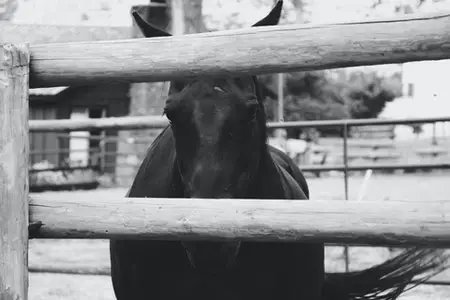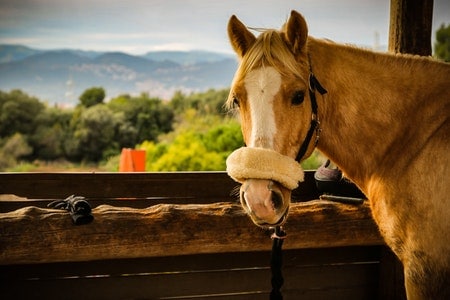For horses, loose stool or diarrhea isn’t a good sign and it’s definitely something you should take care of. When diarrhea persists for a long period, the horse will become dehydrated and may develop some type of colic which is an even more complicated condition.
If you notice your horse continues to produce loose stool after 24 hours, you should quickly talk to your vet who will inform you of the next course of action to take. You may find that things return to normal in one or two days. However, it’s always best to play it safe and seek advice from a trained professional.
Normal stool released by horses usually takes a solid roundish-bun shape. When the stool becomes more watery, it means the normal processes which occur in the horse’s digestive system have been altered in one way or another.
Loose stool or diarrhoea is often a symptom of an underlying issue so it actually informs you that something is going wrong with the horse. The causes could be mild or quite severe.
There are a number of other symptoms that you might observe alongside loose stool. These include weight loss, reduced appetite, projectile pooping, mucus or blood in manure, tiredness, pale gums, dehydration, etc. Inform your vet of any symptoms you observe as that’ll help with the proper diagnosis..

These are some factors that may result in the production of watery stool in horses:
- Behavioral cause: A horse’s reaction to a new environment or situation may trigger stress or nervousness. Whether it’s keeping the horse in a tight space or bringing it to a foreign event, the horse may find it stressful and that can affect its digestive system.
- Bacterial infections: A stooling horse may be infected by bacteria like salmonella
- Change in feed: If you suddenly change your horse’s feed or excessively feed the horse its regular feed, the horse may experience diarrhea.
- Lush pasture
- Spoilt feed
- Food allergy
- Certain drugs
- Antibiotics
- Cancer in the animal’s digestive tract
- Parasites
You may also notice other symptoms in addition to loose stool; you need to get help if you observe any of the following symptoms below:
- Other signs of colic
- Presence of mucus or blood in manure
- Projectile pooping
- High rectal temperature
- Loss of appetite
- Dehydration
- Pale gums
What Should You Feed Horses with Loose Droppings?
Reduce meals high in starch: In the horse’s gut, there are bacteria present that help to break down forage and this process occurs in an environment with a neutral pH. When so much undigested starch or sugar reaches the gut, fermentation takes place to release lactic acid. An acidic environment kills important bacteria which can cause different complications, including the production of loose droppings, laminitis, and colic.
Forage: Forage should form your horse’s main diet. They should consume forage weighing at least 1.5% of their body weight daily. Consumption of forage will help to maintain the animal’s weight, preventing weight loss and the release of loose droppings.
Introduce supplements: If you observe your horse has diarrhea often, it may help to feed them supplements; pre & probiotic supplements. Probiotics are living microorganisms that increase the population of the good or healthy bacteria present in the animal’s gut. The guts don’t digest prebiotic ingredients, rather they are meant to feed these good bacteria as a way to encourage growth or increase in their population. These supplements are beneficial to the gut and also limit the occurrence of diarrhea.

Prevention
There is no exact clear-cut way to prevent your horse from experiencing diarrhea. However, there are a few things you can do to limit the possibility of an occurrence. Ensure you don’t suddenly change your horse’s feed, slowly introduce them instead. Do the same introduction with lush pastures.
The microorganisms present in the gut need some time to adapt to whatever change you’d like to make to their diet. A sudden change can upset the microbes and lead to diarrhea. Vaccinate your horse with the appropriate vaccines; it is important you do so.
Treatment
The treatment option will be determined by what caused your horse to produce watery stool. If it’s simply because it was in a stressed situation, then the situation can be easily reversed once the horse gets comfortable again. For instances like this, loose droppings don’t necessarily mean your horse is ill. If diarrhoea persists, you may need to call the vet for a proper diagnosis.
Your vet will determine the root cause of the issue by either taking a sample of the faeces or a blood sample. You might also be instructed to keep an affected horse away from others to protect them in the event the cause happens to be contagious. The vet will figure out the problem and prescribe the appropriate treatment options for your horse to get better.
Final Thoughts
Loose droppings or diarrhea in horses is usually an indicator of an underlying issue whether it’s behavioral, a disease condition, or a sudden change in diet. There may be a few things you can do to remedy the situation, however, you should talk to your vet if diarrhea continues after 24 hours.
Diet and stress can contribute to the occurrence of diarrhea so ensure your horse is properly fed and you introduce a new diet slowly. Also, manage and limit stressful situations for your horse. Don’t hesitate to visit your vet when it becomes necessary to do so.
A healthy horse is a happy horse!

